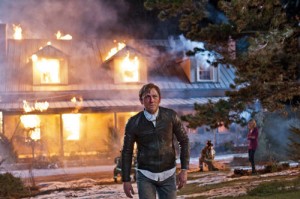Director up in the clouds RICHARD CROUSE METRO CANADA Published: September 26, 2011
 Shortly into my conversation with Irish filmmaker Jim Sheridan I begin to understand what his daughter Kristen meant when she said her father “exists up in the clouds. In order to communicate with him, you have to go up into the clouds yourself.”
Shortly into my conversation with Irish filmmaker Jim Sheridan I begin to understand what his daughter Kristen meant when she said her father “exists up in the clouds. In order to communicate with him, you have to go up into the clouds yourself.”
When I mention the quote to the Dream House director he laughs and tries to explain.
“I think that’s probably true in relation to the way I approach actors and story. I know directors like Tim Burton or David Fincher, they’re very structured visually. Then there’s the approach that says, ‘It’s emotional over here.’
But emotions are invisible and it’s hard to catch the invisible. Trying to catch the invisible is very interesting because it’s just something that happens in front of you rather than something that has happened, as Hitchcock said, and then I’m only shooting it.”
A scheduled 10 minute interview stretches into 35 minutes as the three-time Oscar nominee chats amiably about the movies he thinks will eventually become classics — “the poetic ones that don’t make as much sense” — on artistic vision — “it’s a product of interior emotion” — the meaning of the Kubrick film 2001 — “it’s a baptism!” — and, of course, his new movie.
In Dream House real life newlyweds Daniel Craig and Rachel Weisz are Will and Libby, a happily married couple who leave New York City for a simpler life in New England. Of course, this is a thriller, so their hopes for a happy life are dashed when they discover their new home was the site of a grisly murder.
“It’s a genre piece,” he says.
“It’s a psychological thriller with horror overtones and detective story overtones, but essentially, deep down it’s a love story. It’s in the vein of A Beautiful Mind and Shutter Island. We’ve made the kind of movie with thriller and horror elements, but women will like it.”
Sheridan may exist in the clouds, but he is realistic about the state of the movie business. The kind of character dramas that made him famous are harder to get made these days.
“One day, I don’t know what day it was, maybe a Thursday, about a year ago, everybody decided you couldn’t make a drama anymore,” he says. “I think there was a surfeit of independent movies when there was a surfeit of money,” he says. “In Ireland we built too many houses, in America we made too many movies.”
